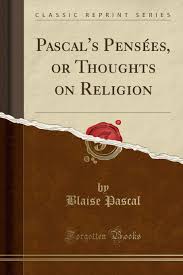Pensées Page #11
The Pensées is a collection of fragments on theology and philosophy written by 17th-century philosopher and mathematician Blaise Pascal. Pascal's religious conversion led him into a life of asceticism, and the Pensées was in many ways his life's work. The Pensées represented Pascal's defense of the Christian religion.
Since everything then is cause and effect, dependent and supporting, mediate and immediate, and all is held together by a natural though imperceptible chain, which binds together things most distant and most different, I hold it equally impossible to know the parts without knowing the whole, and to know the whole without knowing the parts in detail. [The eternity of things in itself or in God must also astonish our brief duration. The fixed and constant immobility of nature, in comparison with the continual change which goes on within us, must have the same effect.] And what completes our incapability of knowing things, is the fact that they are simple, and that we are composed of two opposite natures, different in kind, soul and body. For it is impossible that our rational part should be other than spiritual; and if any one maintain that we are simply corporeal, this would far more exclude us from the knowledge of things, there being nothing so inconceivable as to say that matter knows itself. It is impossible to imagine how it should know itself. So if we are simply material, we can know nothing at all; and if we are composed of mind and matter, we cannot know perfectly things which are simple, whether spiritual or corporeal. Hence it comes that almost all philosophers have confused ideas of things, and speak of material things in spiritual terms, and of spiritual things in material terms. For they say boldly that bodies have a tendency to fall, that they seek after their centre, that they fly from destruction, that they fear the void, that they have inclinations, sympathies, antipathies, all of which attributes pertain only to mind. And in speaking of minds, they consider them as in a place, and attribute to them movement from one place to another; and these are qualities which belong only to bodies. Instead of receiving the ideas of these things in their purity, we colour them with our own qualities, and stamp with our composite being all the simple things which we contemplate. Who would not think, seeing us compose all things of mind and body, but that this mixture would be quite intelligible to us? Yet it is the very thing we least understand. Man is to himself the most wonderful object in nature; for he cannot conceive what the body is, still less what the mind is, and least of all how a body should be united to a mind. This is the consummation of his difficulties, and yet it is his very being. Modus quo corporibus adhærent spiritus comprehendi ab hominibus non potest, et hoc tamen homo est.[35] Finally, to complete the proof of our weakness, I shall conclude with these two considerations.... 73 [But perhaps this subject goes beyond the capacity of reason. Let us therefore examine her solutions to problems within her powers. If there be anything to which her own interest must have made her apply herself most seriously, it is the inquiry into her own sovereign good. Let us see, then, wherein these strong and clear-sighted souls have placed it, and whether they agree. One says that the sovereign good consists in virtue, another in pleasure, another in the knowledge of nature, another in truth, Felix qui potuit rerum cognoscere causas,[36] another in total ignorance, another in indolence, others in disregarding appearances, another in wondering at nothing, nihil admirari prope res una quæ possit facere et servare beatum,[37] and the true sceptics in their indifference, doubt, and perpetual suspense, and others, wiser, think to find a better definition. We are well satisfied. To transpose after the laws to the following title. We must see if this fine philosophy have gained nothing certain from so long and so intent study; perhaps at least the soul will know itself. Let us hear the rulers of the world on this subject. What have they thought of her substance? 394.[38] Have they been more fortunate in locating her? 395.[39] What have they found out about her origin, duration, and departure? 399.[40] Is then the soul too noble a subject for their feeble lights? Let us then abase her to matter and see if she knows whereof is made the very body which she animates, and those others which she contemplates and moves at her will. What have those great dogmatists, who are ignorant of nothing, known of this matter? Harum sententiarum,[41] 393. This would doubtless suffice, if reason were reasonable. She is reasonable enough to admit that she has been unable to find anything durable, but she does not yet despair of reaching it; she is as ardent as ever in this search, and is confident she has within her the necessary powers for this conquest. We must therefore conclude, and, after having examined her powers in their effects, observe them in themselves, and see if she has a nature and a grasp capable of laying hold of the truth.] 74 A letter On the Foolishness of Human Knowledge and Philosophy. This letter before Diversion. Felix qui potuit ... Nihil admirari.[42] 280 kinds of sovereign good in Montaigne.[43] 75 Part I, 1, 2, c. 1, section 4.[44] [Probability.--It will not be difficult to put the case a stage lower, and make it appear ridiculous. To begin at the very beginning.] What is more absurd than to say that lifeless bodies have passions, fears, hatreds--that insensible bodies, lifeless and incapable of life, have passions which presuppose at least a sensitive soul to feel them, nay more, that the object of their dread is the void? What is there in the void that could make them afraid? Nothing is more shallow and ridiculous. This is not all; it is said that they have in themselves a source of movement to shun the void. Have they arms, legs, muscles, nerves? 76 To write against those who made too profound a study of science: Descartes. 77 I cannot forgive Descartes. In all his philosophy he would have been quite willing to dispense with God. But he had to make Him give a fillip to set the world in motion; beyond this, he has no further need of God. 78 Descartes useless and uncertain. 79 [Descartes.--We must say summarily: "This is made by figure and motion," for it is true. But to say what these are, and to compose the machine, is ridiculous. For it is useless, uncertain, and painful. And were it true, we do not think all philosophy is worth one hour of pain.] 80 How comes it that a cripple does not offend us, but that a fool does?[45] Because a cripple recognises that we walk straight, whereas a fool declares that it is we who are silly; if it were not so, we should feel pity and not anger. Epictetus[46] asks still more strongly: "Why are we not angry if we are told that we have a headache, and why are we angry if we are told that we reason badly, or choose wrongly?" The reason is that we are quite certain that we have not a headache, or are not lame, but we are not so sure that we make a true choice. So having assurance only because we see with our whole sight, it puts us into suspense and surprise when another with his whole sight sees the opposite, and still more so when a thousand others deride our choice. For we must prefer our own lights to those of so many others, and that is bold and difficult. There is never this contradiction in the feelings towards a cripple.
Translation
Translate and read this book in other languages:
Select another language:
- - Select -
- 简体中文 (Chinese - Simplified)
- 繁體中文 (Chinese - Traditional)
- Español (Spanish)
- Esperanto (Esperanto)
- 日本語 (Japanese)
- Português (Portuguese)
- Deutsch (German)
- العربية (Arabic)
- Français (French)
- Русский (Russian)
- ಕನ್ನಡ (Kannada)
- 한국어 (Korean)
- עברית (Hebrew)
- Gaeilge (Irish)
- Українська (Ukrainian)
- اردو (Urdu)
- Magyar (Hungarian)
- मानक हिन्दी (Hindi)
- Indonesia (Indonesian)
- Italiano (Italian)
- தமிழ் (Tamil)
- Türkçe (Turkish)
- తెలుగు (Telugu)
- ภาษาไทย (Thai)
- Tiếng Việt (Vietnamese)
- Čeština (Czech)
- Polski (Polish)
- Bahasa Indonesia (Indonesian)
- Românește (Romanian)
- Nederlands (Dutch)
- Ελληνικά (Greek)
- Latinum (Latin)
- Svenska (Swedish)
- Dansk (Danish)
- Suomi (Finnish)
- فارسی (Persian)
- ייִדיש (Yiddish)
- հայերեն (Armenian)
- Norsk (Norwegian)
- English (English)
Citation
Use the citation below to add this book to your bibliography:
Style:MLAChicagoAPA
"Pensées Books." Literature.com. STANDS4 LLC, 2024. Web. 25 Nov. 2024. <https://www.literature.com/book/pens%C3%A9es_114>.




Discuss this Pensées book with the community:
Report Comment
We're doing our best to make sure our content is useful, accurate and safe.
If by any chance you spot an inappropriate comment while navigating through our website please use this form to let us know, and we'll take care of it shortly.
Attachment
You need to be logged in to favorite.
Log In